I’ve been paging through 抗战漫画 a book re-printing lots of wartime cartoons. Although some work has been done on these, one thing I have not seen commented on much are the pro-Japanese cartoons
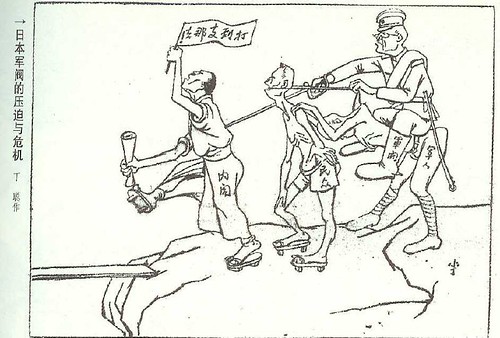
Here we see Japanese soldiers and people being driven to disaster by a “warlord” 军阀.
It is of course true that war and militarism were bad for the Japanese people. It is however somewhat surprising to find this point in wartime propaganda. This is a bit less surprising when you consider the history of anti-militarism
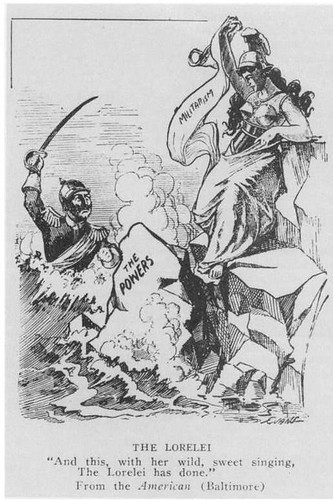
Lots of people in interwar Europe and America thought that wars were simply ginned up by munitions companies. Even Superman agreed. For the Socialists of course nationalism of any sort was just false consciousness and wars were capitalist plots. Here (right) is a typical anti-militarism cartoon from 1914.
Chinese cartoonists were clearly influenced by the visual style of foreign work, and they seemed to pick up on some of this anti-militarism. Below we see the Japanese people being gradually de-humanized as they are brought into the army.
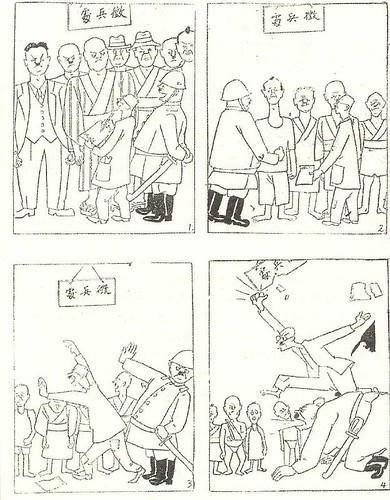
This and the Chinese cartoon above seem to be from about 1936. I assume that in addition to direct foreign influence Chinese cartoonists were influenced by evolving Chinese ideas about warlords and militarism. Waldron analyzes these developments. Chen Duxiu was the first to use the term “Junfa” in China, and he initially connected them to international capitalism, which is not surprising. There had been a considerable debate in the West over the origins of militarism, with the Marxists, like Engels, claiming that it was a product of economic conditions, and others, like Duhring, claiming that militarism was a force in itself. Thus, Anti-Duhring. Waldron argues that Chen was importing the idea of militarism from Japan, and certainly Japanese critics had used the idea to attack the strong and growing role of the military in Japan. In China there was a lot of talk about warlordism, and during May 4th it was defined as one of the main things wrong with China. Warlordism took on a particularly Chinese cast, however, as many Chinese writers did not see them as either an autonomous force or emanations of capitalism or imperialism. Chen Duxiu and others came to blame the problem of warlordism on the lack a strong central power, and many looked for a leader who was “a general but not a warlord” to bring the fractious militarists to heel (Chiang Kai-shek was touted by some.) Hu Shih, on the contrary, claimed that warlordism was the product of too much centralization, and only when authoritarian central rule ended would strong local institutions emerge, allowing a peaceful, federal China to be built. Walron points out that this is just the old local power vs. central power debate (junxian vs. fengjian) playing itself out yet again.
What I find most odd is how this pro-Japanese people stuff continues well into the war period. There are of course lots of panels of atrocities and barbaric Japanese, but as late as 1939 (at least) you still see things like this
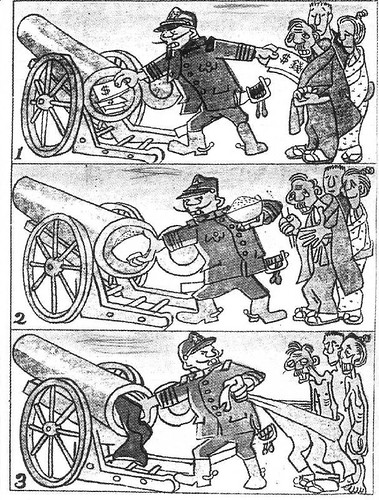
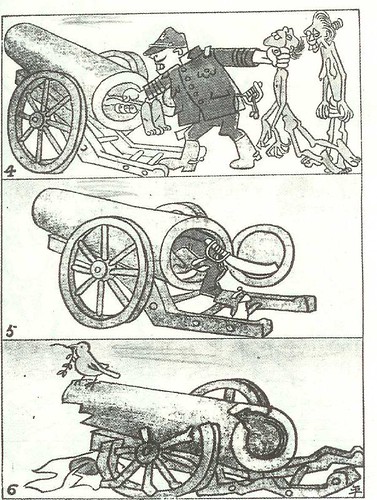
This is after the fall of Shanghai and the Rape of Nanjing. It obviously owes something to Western ideas of militarists as exploiters of the people, but the people here seem to be Japanese, and the solution is not victory over Japan but peace. I guess that part of the reason for this odd propaganda is that Chinese were unlikely to see warlords as a sign of the innate evil of the race (as American wartime propaganda did with Japan) given that China itself had warlords not too long before. It was not likely that Chinese would portray Japanese militarism as the outgrowth of world capitalism, as that might make them seem too powerful. Waldron however, that by the 30s Chinese warlords were being seen as part of the past and an almost comic one at that.1 Maybe by using the old images of warlordism and militarism Chinese artists were making the Japanese seem less important and doomed to irrelevance.
although most his evidence here seems to be from Westerners ↩
That last cartoon — especially the last panels — bears a striking resemblance to the anti-war children’s book Drummer Hoff.
The idea of evil warlords/capitalists oppressing the masses of Japan does have a sort of Marxist sense to it, though it is indeed an odd tack to take in propoganda, unless they thought it might also get back to Japanese soldiers who could be influenced to resist/desert/etc.